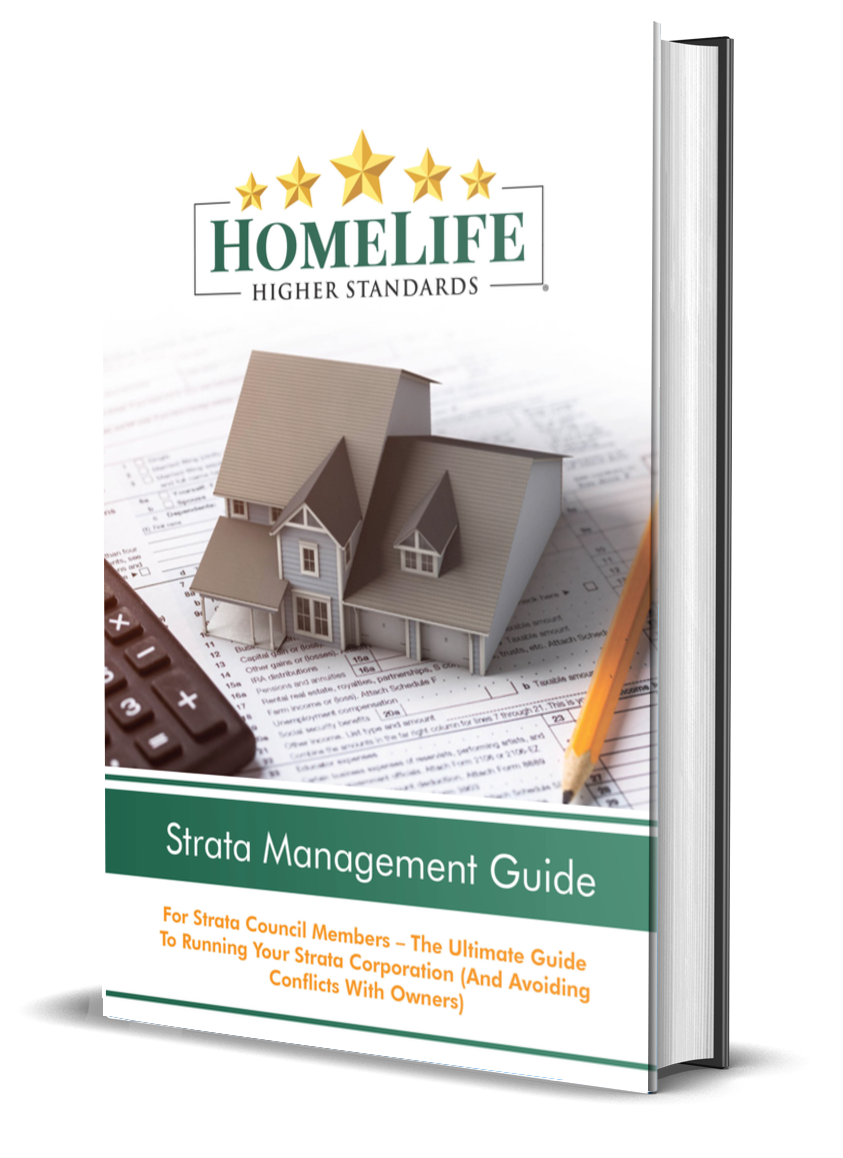FOR STRATA COUNCIL MEMBERS
The Ultimate Guide To Running Your Strata Corporation
(And Avoiding Conflicts With Owners)

So you’re in a strata council and feel lost at sea. It’s understandable – so much goes into strata management, it’s hard to pinpoint where to begin!
This ultimate guide is tailored to give you confidence in your role as a strata member. Here’s everything the guide offers you:
The Complete List Of Council Member Responsibilities
To be in your strata council, you must be elected into your position. Here’s who can vote:
- Owners
- Current council members
- Attendants by proxy – an owner assigns someone to vote on their behalf when they can’t attend the election. Anyone can be an attendant, except a property manager.
You and others on the council are in charge of:
- Daily decisions that keep the strata running smoothly, such as:
- Elevator maintenance
- Curbside garbage pickup
- Proper operations under the
- Bylaw creation and enforcement
Here’s a deeper breakdown of strata council responsibilities:
- Planning and executing meetings, such as:
- The annual general meeting (AGM)
- Special general meetings (SGM)
- Consistent general meetings
- Writing out the budget of the strata, which includes:
-
Capital Planning
-
Contingency Fund
-
-
Collecting strata fees (also known as levies) and fines
- Being easy to contact, by either:
- Phone, Email
- Hiring contractors and supervising them to ensure jobs are done correctly
- Keeping important documents, such as:
- A list of owner and tenant names
- All strata corporation records. For example:
> Depreciation reports
> Invoices
-
Filling out Form B’s and Form F’s when required
-
Granting owners and tenants usage of common property for short periods
Strata property owners vote to approve any actions. The 2 main actions that require a vote are:
- Creating/changing bylaws
- Approving special levies, such as:
- Roof replacement
-
Budget shortfall
Not interested in doing all of this yourself? Many strata corporations hire a property manager (who can take care of these duties for you).
But remember – if you have a terrible property manager who doesn’t follow the Strata Property Act, you still are responsible.

The 4 Strata Council Roles:
Is Your President Doing Your Secretary’s Job?

President
You’re the face of the strata, and the first person people turn to outside of your selected property manager.
You:
- Set and attend all meetings
- Communicate with homeowners by:
- Ensuring meeting minutes are given to owners
- Set agenda for meetings (what’s the purpose of the meetings?)
- Oversee the rest of the council – ensure everything is getting done.

Vice President
You assist the president and step up when the president’s not around.

Secretary
You’re in charge of:
- Tracking meeting minutes
- Communicating with owners for:
- Concerns
- Questions
- Suggestions
- Keeping all records/documents in a safe and accessible place.

Treasurer
You are the finance guru of the council.
- Review the financials, such as:
- Budget
- Contingency fund
- All invoices
- Advise the council on budget alterations
- Sign cheques for:
- Contractors
- Insurance
- Strata fees
A council needs a minimum of 3 people who split the roles above fairly.
The maximum amount of people who can be on the council is 7.
If property owners decide to elect more than 4 people onto the council, they then decide what position and duties to give the remaining 3 people (also known as members at large).
Here are some extra duties that can be given:
- Maintaining landscape around the building
- Hiring security
Here’s who can fulfill these duties:
- A committee created and overseen by the council
- Extra members of the council
Feel like you’re going to implode with information? That’s when a property manager comes in.
What Your Property Manager Does for You
The room’s on fire. People are screaming.
There are 6 different doors, but only 1 that actually leads to escape.
Pick the wrong one, and the whole building crumbles. Panicked arguments ensue.
Then a figure steps up and settles everyone down.
They confidently point to a door.
It’s the right one, and everyone makes it out alive.
Think of your property manager as the person who knew what door to take. They were able to calm the room and lead everyone out of the flames.
They know which door to pick because they’re good at:
FINANCIAL ORGANISING
Financial Planning
We’re here to advise you with structuring your budget. We assist with:
> Your budgeting process
- Most reasonable budget for each independent strata
- Capital planning
> Depreciation reports (planning and preparing for maintenance)
- Reroofing
- Repainting
> Contingency fund requirements
- Put in place as a safety net for all emergency needs.
Records and Transaction
We help you keep accurate records of:
- Payables
- Receivables
- Payroll services
-
Employee bonding
We also produce:
- Strata fee schedules
- Operating budgets
- Monthly financial statements
Your Manager is always available to answer any questions you may have.
Revenue Assurance
Hate collecting fees? We do it for you! We process all fees that are collected through:
- Auto-deposit
- In-person transactions
You’ll get help with:
- Levies
- Miscellaneous charges
- Bylaw infractions
- Lien process
- Interest
- Collection of delinquent accounts
- Outstanding strata fees
- Fine assessments
We deposit all funds to your
COMMUNICATION
Consultative Meetings
Each strata is different – we tailor to all of them. If we can’t do something because we’re not experts in that field, we assist you in finding the right person.
Examples of required experts are:
- Architects
- Lawyers
- Engineers
Constant Communication
You’re always able to contact us, and we’ll always keep you up to date with changes, such as:
- Daily operations within your strata
- Water shut-offs
- Capital asset projects (reroofing, etc.)
- Changes to garbage schedule
- Legislative requirements
- Changes to rental restriction bylaws
- New cannabis legislation
Streamlined Meetings
Strata management = a plethora of meetings.
We’re here to help organise any meetings that need to take place, such as:
- AGM (annual general meeting) Required once a year
- SGM (special general meeting)
- Called at any time by owners or council.
- Deals with bylaws
- General council meetings
- Meetings with elected officials
- Deals with the month to month details of strata.
- Regularly scheduled.
We help enforce attendance by emailing reminders, and preparing and distributing agendas.
Emergency Services
If the worst happens (e.g. fire or flood), we support you and your Council through the difficult times ahead.
We offer:
- A 24-hour emergency service for all owners
…and organisation of:
- The clean-up
- Insurance claims
- Anything else that crops up in an emergency.
LEGAL & UPKEEP SERVICES
Repairs and Maintenance
Your strata is responsible for the upkeep of the building’s common property – which changes with each strata.
Examples of maintenance:
- The roof
- Paint
- Carpets
- Windows
- Doors
- Elevator
- Roadways
- Underground parking
- Landscape maintenance
Because of our size, we have huge negotiating power to get you discounts on repair and maintenance contracts. We also aid with:
The bidding process
Administration of all contract services
Insurance and Government Responsibilities
Get assistance with the organization of the Annual Appraisal of Assets (industry standard insurance appraisal) and any insurance claims.
Our expertise gives you an advantage in negotiating insurance premiums.
Every year, we prepare and submit a T-2 Taxation Form to Canada Revenue Agency.
We also prepare and submit any documentation required by WorkSafe BC.
Contractors who work for our clients need WorkSafe.
We confirm they have it.
If they don’t, we can’t pay them until they do.
Site Management
We act as your representative in all Site Management responsibilities, such as…
…regular monthly property inspections and reports
…supervision of on-site maintenance workers
…assistance with bylaw and rules enforcement procedures
- we work with the contractors on site, monitor what they’re doing, set expectations, and confirm the work was done properly.
- If there are issues, we act as the voice of the Strata council.
We enforce any contracts.
Legal Services
We act as your registered office for all:
- Legal documents
- Meeting Minutes
- Registers
- Financial records pertaining to your strata property
We also liaise with your lawyers on any legal matters, such as:
- Wording of bylaws
- Wording of any resolutions of expenditures
- Enforcement of bylaws
- Foreclosure proceedings.
- Negotiating deals with the city in regards to land requisition.
- Land acquisition.
We liaise with the council through the civil resolution tribunal for any small claims.
It’s required to have a legal address for all strata documents to be stored and delivered to.
With us as that point of contact for you, there’s no worry over registering a different address every year (which happens if you use a council member as the point of contact). You only have to register us once.
Still confused about strata? > Check out our Ultimate Strata Management Guide!
How To Tell If A Strata Management Company Is A Good One For You
(And Avoid Being Stuck With A Manager Who Doesn’t Follow Through)
How do you even know if your management company is doing their jobs?
It’s not obvious, and it’s probably a big pain to audit every aspect of their systems.
We have a secret weapon here.
Use these 3 questions as a “shortcut audit” to find out the quality of your management company:
- How quickly do you respond to phone calls and emails from your clients?
- What sort of training do you offer strata councils?
- How well do you know the ins and outs of property management?
1. How quickly do you respond to phone calls and emails from your clients?
One of the biggest frustrations people in strata have is poor communication from their management company.
If the company you’re asking doesn’t assure you that they respond quickly, it’s a big red flag for you. Poor communication = a crumbling strata.
2. What sort of training do you offer strata councils?
If you’re on a strata council, chances are you didn’t go to SCU (Strata Council University – that’s just a little bit of strata humor for ya).
You’re elected and then left out to dry.
Get a strata management company that will train you so you feel like you DID go to SCU. Ask to see their training processes.
Here’s an example of the training process you’d want to see (this is the one we use):
Council Training Process
Step 1: Your manager sets a meeting with your council.
Step 2: They advise you on how to set up processes and procedures for:
- Meetings
- Bylaw creation
- Budget
- Maintenance
Step 3: Your manager discusses how to:
- Openly listen to all opinions
- Not judge ideas
- Listen to all sides of a story
- Encourage excellent communication
- Conduct business in a respectful manner
3. Can you tell me about the recent strata legislation changes this year?
You probably assume all property managers go through extensive training before they’re released into the wild – er, workforce.
Not the case.
The law requires all property managers to have licenses through the Real Estate Council Of BC (attained through the Sauder School of Business of UBC) but that doesn’t mean they’re competent.
This means that important shifts in legislation, which in turn affects you and your strata, slip by unnoticed if you have a property manager who doesn’t actively pay attention.
You want a manager who:
- Is aware of all legislation changes
- Keeps up with changes in the Strata Property Act
Some companies don’t keep their managers aware of changes in the industry.
What companies should do is hold regular meetings to keep everyone aware of legislation and Strata Property Act changes.
Avoid These 4 Strata-Crumbling Mistakes
A strong, well-informed strata is the goal. To reach that goal, council members should never:
Be difficult to contact -
—(e.g. never answer your phone). Your property manager can’t do anything until they have authorisation from the council.
Be a bully -
don’t be a bully to anyone in the strata, which includes:
- Other council members
- Rental tenants
- Property owners
Work alone -
you must always work as a team. Major decisions aren’t made by 1 member of the council.
Break bylaws -
council members are role models for everyone else. You set the bylaws, you comply with them. Most common bylaws people break are generally the ones that deal with the 3 P’s people, pets and parking.
How To Run The 3 Different Kinds Of Council Meetings
There are 3 kinds of meetings that a council sets:
Annual General Meeting, or AGM
This meeting is mandatory and must take place every year. This meeting covers:
- The annual budget and strata fees (must be voted on by the strata owners)
Special General Meeting, or SGM
This type of meeting takes place when bylaws must be changed/added to. Owners or council members can call an SGM any time.
Bylaw adjustments must always be voted on by owners.
You also call an SGM if you wish to hire or change your property management company.
General Meeting
This type of meeting happens regularly. Only the council and property manager needs to be present. It covers:
- The month to month details of the strata, such as:
- Maintenance
- Issues that have been brought up by owners, tenants, and council
While the different kinds of meetings cover different aspects of the strata, they all follow the same basic procedure. Each council member/owner taking part in the meeting must:
Share all relevant information -
don’t keep secrets that can harm the strata! Did you overhear a tenant claiming they won’t follow certain bylaws? Bring it up!
Focus only on the subject at hand -
don’t focus on individual responsibilities – just discuss the problems.
Be specific -
use coherent examples to illustrate what you’re talking about during the meeting.
- For example: if some repair work needs to get done, come into the meeting with what specifically needs to get repaired. Gutters? Windows? If you don’t, the meeting takes much longer than necessary hashing out the specifics.
It’s also important that the members in the meeting:
Actually listen -
All opinions have value, even if they’re coming from someone you don’t really like. Listening closely to all concerns and suggestions can solve many strata issues before they become worse. Plus, just the mere act of showing that you’re listening (paraphrasing their concerns back to them) can resolve issues (even if you don’t offer any real solutions).
Meeting minutes -
Be sure to send all meeting minutes to owners so they’re kept in the loop. This tells owners that you’re working on all current issues. Always get minutes to owners within 2 weeks after the meeting.
Be specific -
If the vote for something isn’t unanimous, it’s important that those who are in the minority don’t make a fuss. Gracefully support the decision that’s made by the majority.
Ready To Hire A Property Management Company?
Follow This Simple 4 Step Process!
Whether it’s your first company or you’re switching over, the process is as follows:
Step 1: Special General Meeting
First things first – have an SGM meeting to ensure everyone approves changing/hiring a new property management company.
Step 2: Sever Ties
This step only applies to you if you’re changing companies.
Your council must approach your current management company and ask to be let out of their contract.
There’s generally no problem with this – the company should respect your desire and promptly set things up for your departure from them.
Step 3: First Contact
Request a proposal and phone us at 604-858-7368
Is your previous company reluctant to let you go? The property management company you’re changing to can aid you in making the switch.
Step 4: Agency Agreement
As per the Real Estate Council, your new company can’t provide any services until the Agency Agreement is in place. It goes hand in hand with the proposal.
You need to bring the minutes of your SGM (where you decided to change/add your company) before the agreement can be finalised.
They can work behind the scenes (give guidance) until the agreement is set.
This takes a maximum of 2 days. Once set, the changes are official!
Is Your Strata Non-Conforming?
You’re not sure if the strata bills are being paid.
If they are, by who?
There’s not a single bylaw in place (that you know of), and you’re pretty sure the roof has about 10 different leaks. Not to mention all of the paperwork has disappeared.
While this situation isn’t common (new buildings that don’t have an elected council are led by the developer until the first AGM), it does happen from time to time. This is called a non-conforming strata.
And guess what? A non-conforming strata can cause upset tenants to sue, or for unapproved alterations (like patio construction) to take place. If you try to sell, the process becomes incredibly complicated because you can’t get the paperwork you need.
If your building is in need of a proper council and you don’t know where to start, contact us so we can:
- Sit down with you to figure out what needs to change in your strata
- Give you direction on how to set an SGM for the Agency Agreement
After those 2 steps, the rest of the process is the same as hiring or changing your property manager.
Hire A Property Manager For Your Development Today
It’s common for us to repeatedly work with the same developers. Many tend to have numerous developments that need a well-run strata corporation.
If you’ve worked with us before, hiring us for another one of your developments is very easy. Just fill out the following form and we’ll get the process started for your next project.
